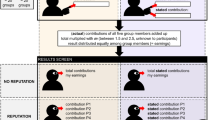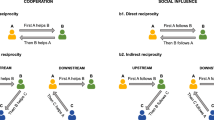Abstract
The Social Heuristics Hypothesis claims that cooperation is intuitive because it is positively reinforced in everyday life, where behaviour typically has reputational consequences1,2. Consequently, participants will cooperate in anonymous laboratory settings unless they either reflect on the one-shot nature of the interaction or learn through experience with such settings that cooperation does not promote self-interest. Experiments reveal that cognitive-processing manipulations (which increase reliance on either intuition or deliberation) indeed affect cooperation3, but may also introduce confounds4,5. Here, we elide the interpretation issues created by between-subjects designs in showing that people are less cooperative over time in laboratory paradigms in which cooperation cannot promote self-interest, but are just as cooperative over time in paradigms that have the potential to promote self-interest. Contrary to previous findings6,7, we find that cooperation is equally intuitive for men and women: unilateral giving did not differ across gender at the first study session, and decreased equally for both genders across sessions.
This is a preview of subscription content, access via your institution
Access options
Access Nature and 54 other Nature Portfolio journals
Get Nature+, our best-value online-access subscription
$29.99 / 30 days
cancel any time
Subscribe to this journal
Receive 12 digital issues and online access to articles
$119.00 per year
only $9.92 per issue
Buy this article
- Purchase on Springer Link
- Instant access to full article PDF
Prices may be subject to local taxes which are calculated during checkout
Similar content being viewed by others
Data availability
All data are available at https://osf.io/jckvq/.
References
Rand, D. G., Greene, J. D. & Nowak, M. A. Spontaneous giving and calculated greed. Nature 489, 427–430 (2012).
Yamagishi, T., Terai, S., Kiyonari, T., Mifune, N. & Kanazawa, S. The social exchange heuristic: managing errors in social exchange. Ration. Soc. 19, 259–291 (2007).
Rand, D. G. Cooperation, fast and slow: meta-analytic evidence for a theory of social heuristics and self-interested deliberation. Psychol. Sci. 27, 1192–1206 (2016).
Bouwmeester, S. et al. Registered replication report: Rand, Greene, and Nowak (2012). Perspect. Psychol. Sci. 12, 527–542 (2017).
Capraro, V. & Cococcioni, G. Rethinking spontaneous giving: extreme time pressure and ego-depletion favor self-regarding reactions. Sci. Rep. 6, 27219 (2016).
Rand, D. G., Brescoll, V. L., Everett, J. A., Capraro, V. & Barcelo, H. Social heuristics and social roles: intuition favors altruism for women but not for men. J. Exp. Psychol. Gen. 145, 389–396 (2016).
Eckel, C. C. & Grossman, P. J. Are women less selfish than men?: Evidence from dictator experiments. Econ. J. 108, 726–735 (1998).
Kiyonari, T., Tanida, S. & Yamagishi, T. Social exchange and reciprocity: confusion or a heuristic? Evol. Hum. Behav. 21, 411–427 (2000).
Barclay, P. Harnessing the power of reputation: strengths and limits for promoting cooperative behaviors. Evol. Psychol. 10, 868–883 (2012).
Binmore, K. & Shaked, A. Experimental economics: where next? J. Econ. Behav. Organ. 73, 87–100 (2010).
Forsythe, R., Horowitz, J. L., Savin, N. E. & Sefton, M. Fairness in simple bargaining experiments. Games Econ. Behav. 6, 347–369 (1994).
Berg, J., Dickhaut, J. & McCabe, K. Trust, reciprocity, and social history. Games Econ. Behav. 10, 122–142 (1995).
Yamagishi, T. et al. Cortical thickness of the dorsolateral prefrontal cortex predicts strategic choices in economic games. Proc. Natl Acad. Sci. USA 113, 5582–5587 (2016).
Cappelen, A. W., Nielsen, U. H., Tungodden, B., Tyran, J.-R. & Wengström, E. Fairness is intuitive. Exp. Econ. 19, 727–740 (2016).
Dreber, A., Ellingsen, T., Johannesson, M. & Rand, D. Do people care about social context? Framing effects in dictator games. Exp. Econ. 16, 349–371 (2013).
Cain, D. M., Dana, J. & Newman, G. E. Giving versus giving in. Acad. Manag. Ann. 8, 505–533 (2014).
Franzen, A. & Pointner, S. Anonymity in the dictator game revisited. J. Econ. Behav. Organ. 81, 74–81 (2012).
Delton, A. W., Krasnow, M. M., Cosmides, L. & Tooby, J. Evolution of direct reciprocity under uncertainty can explain human generosity in one-shot encounters. Proc. Natl Acad. Sci. USA 108, 13335–13340 (2011).
Krasnow, M. M., Delton, A. W., Tooby, J. & Cosmides, L. Meeting now suggests we will meet again: implications for debates on the evolution of cooperation. Sci. Rep. 3, 1747 (2013).
Rand, D. G. & Kraft-Todd, G. T. Reflection does not undermine self-interested prosociality. Front. Behav. Neurosci. 8, 300 (2014).
Rand, D. G. et al. Social heuristics shape intuitive cooperation. Nat. Commun. 5, 3677 (2014).
Gregorich, S. E. Do self-report instruments allow meaningful comparisons across diverse population groups? Testing measurement invariance using the confirmatory factor analysis framework. Med. Care 44, S78–S94 (2006).
Rand, D. G. & Epstein, Z. G. Risking your life without a second thought: intuitive decision-making and extreme altruism. PLoS One 9, e109687 (2014).
Fischbacher, U., Gächter, S. & Fehr, E. Are people conditionally cooperative? Evidence from a public goods experiment. Econ. Lett. 71, 397–404 (2001).
Andreoni, J., Rao, J. M. & Trachtman, H. Avoiding the ask: a field experiment on altruism, empathy, and charitable giving. J. Polit. Econ. 125, 625–653 (2017).
Isler, O., Maule, J. & Starmer, C. Is intuition really cooperative? Improved tests support the social heuristics hypothesis. PLoS One 13, e0190560 (2018).
Everett, J. A., Ingbretsen, Z., Cushman, F. & Cikara, M. Deliberation erodes cooperative behavior—even towards competitive out-groups, even when using a control condition, and even when eliminating selection bias. J. Exp. Soc. Psychol. 73, 76–81 (2017).
Borsboom, D., Mellenbergh, G. J. & Van Heerden, J. The theoretical status of latent variables. Psychol. Rev. 110, 203–219 (2003).
Kawakami, K., Dunn, E., Karmali, F. & Dovidio, J. F. Mispredicting affective and behavioral responses to racism. Science 323, 276–278 (2009).
Schneider, W., Eschman, A. & Zuccolotto, A. E-Prime: User’s Guide (Psychology Software Incorporated, Pittsburgh, 2002).
Johnson, N. D. & Mislin, A. A. Trust games: a meta-analysis. J. Econ. Psychol. 32, 865–889 (2011).
Muthén, L. K. & Muthén, B. O. Mplus User’s Guide (Muthén & Muthén, Los Angeles, 2010).
Acknowledgements
Research was supported by a grant from the John Templeton Foundation (award no. 29165) to M.E.M. The funder had no role in study design, data collection and analysis, decision to publish or preparation of the manuscript. Research was sponsored by the Army Research Laboratory and was accomplished under Cooperative Agreement Number W911NF-18-2-0194. The views and conclusions contained in this document are those of the authors and should not be interpreted as representing the official policies, either expressed or implied, of the Army Research Laboratory or the US Government. The US Government is authorized to reproduce and distribute reprints for government purposes notwithstanding any copyright notation herein.
Author information
Authors and Affiliations
Contributions
M.E.M., W.H.B.M., E.J.P. and D.E.F. conceived of the study. E.J.P., D.E.F. and W.H.B.M. programmed the study, and W.H.B.M. managed data collection. D.E.F. and W.H.B.M. analysed the data and interpreted results. W.H.B.M. drafted the manuscript. W.H.B.M., D.E.F., E.J.P. and M.E.M. revised the manuscript.
Corresponding author
Ethics declarations
Competing interests
The authors declare no competing interests.
Additional information
Publisher’s note: Springer Nature remains neutral with regard to jurisdictional claims in published maps and institutional affiliations.
Supplementary information
Supplementary Information
Supplementary Table 1, Supplementary Notes
Rights and permissions
About this article
Cite this article
McAuliffe, W.H.B., Forster, D.E., Pedersen, E.J. et al. Experience with anonymous interactions reduces intuitive cooperation. Nat Hum Behav 2, 909–914 (2018). https://doi.org/10.1038/s41562-018-0454-9
Received:
Accepted:
Published:
Issue Date:
DOI: https://doi.org/10.1038/s41562-018-0454-9
This article is cited by
-
Distanced self-talk increases rational self-interest
Scientific Reports (2022)



